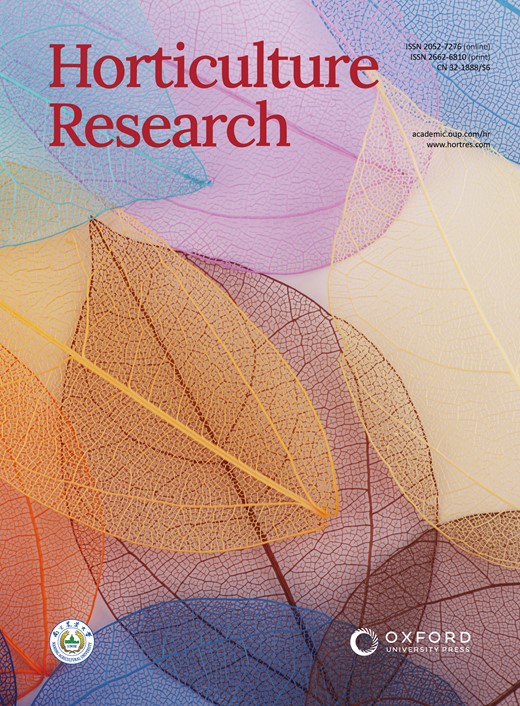生育力恢复基因 CaRf 和 PepperSNP50K 为杂交辣椒提供了一个前景广阔的育种系统
IF 8.7
1区 农林科学
Q1 Agricultural and Biological Sciences
引用次数: 0
摘要
细胞质雄性不育(CMS)在植物育种中至关重要,被广泛应用于包括辣椒在内的各种作物杂交种中。然而,迄今为止还缺乏对辣椒育性恢复基因(Rf)的功能验证。本研究鉴定并描述了辣椒强恢复性近交系樟树岗(Zhangshugang)中对恢复CMS至关重要的单显性基因座CaRf。CaRf 基因编码一种线粒体靶向五肽重复蛋白,通过在杂交 F1 植株中沉默 CaRf 基因诱导雄性不育得到了验证。为提高辣椒育种效率,对 176 个重要的辣椒育种亲本进行了重新测序,并开发了由 51 172 个标记组成的 PepperSNP50K 液相育种芯片。CaRf功能表征与PepperSNP50K的整合促进了优质红辣椒杂交种的培育。这些发现为推进辣椒分子设计育种提供了重要见解和实用策略。本文章由计算机程序翻译,如有差异,请以英文原文为准。
Fertility restorer gene CaRf and PepperSNP50K provide a promising breeding system for hybrid pepper
Cytoplasmic male sterility (CMS) is pivotal in plant breeding and widely employed in various crop hybrids, including pepper. However, the functional validation of the restorer of fertility (Rf) gene in pepper has been lacking until now. This study identifies and characterizes CaRf, a single dominant locus crucial for restoring CMS in the pepper strong recovery inbred line Zhangshugang. The CaRf gene encodes a mitochondria-targeted pentatricopeptide repeat protein, validated through the induction of male sterility upon its silencing in hybrid F1 plants. To enhance pepper breeding efficiency, 176 important pepper breeding parent materials were resequenced, and a PepperSNP50K liquid-phase breeding chip was developed, comprising 51 172 markers. Integration of CaRf functional characterization and PepperSNP50K facilitated the development of a high-quality red pepper hybrid. These findings provide significant insights and practical strategies for advancing molecular-designed breeding in peppers.
求助全文
通过发布文献求助,成功后即可免费获取论文全文。
去求助
来源期刊

Horticulture Research
Biochemistry, Genetics and Molecular Biology-Biochemistry
CiteScore
11.20
自引率
6.90%
发文量
367
审稿时长
20 weeks
期刊介绍:
Horticulture Research, an open access journal affiliated with Nanjing Agricultural University, has achieved the prestigious ranking of number one in the Horticulture category of the Journal Citation Reports ™ from Clarivate, 2022. As a leading publication in the field, the journal is dedicated to disseminating original research articles, comprehensive reviews, insightful perspectives, thought-provoking comments, and valuable correspondence articles and letters to the editor. Its scope encompasses all vital aspects of horticultural plants and disciplines, such as biotechnology, breeding, cellular and molecular biology, evolution, genetics, inter-species interactions, physiology, and the origination and domestication of crops.
 求助内容:
求助内容: 应助结果提醒方式:
应助结果提醒方式:


